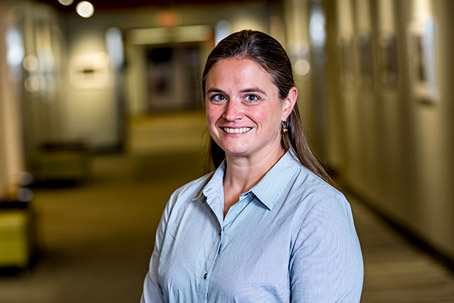Dr. Jennifer Mueller is an expert in ecological engineering and environmental issues within engineering. She has been a consultant for the Environmental Protection Agency on such projects as lead-contaminated soil removal, spill prevention and control, and environmental site assessments. Dr. Mueller is also an advisor for Engineering for a Sustainable World and a tap dancer.
Academic Degrees
She graduated with her BS in Environmental Engineering from Northwestern University and with her MS and PhD in Civil Engineering with an emphasis on Environmental River Mechanics from Colorado State University.
Teaching Interests
Dr. Mueller’s areas of interest include water quality, sustainable design, watershed hydrology, and river hydraulics. Dr. Mueller especially loves mentoring students through capstone senior design projects, where she emphasizes the need for sustainable design through all phases of the design process.
Research Interests
Her graduate work focused on exchange of surface water and groundwater, as well as nitrate uptake, in streams with varying degrees of rehabilitation. Current projects involve pedagogical studies for incorporating sustainability and ethical decision making in undergraduate engineering education, with an emphasis on touchpoints throughout the four-year curriculum.
Publications & Presentations
- Mueller, J. 2024. Sustainability in Education: Preparing Future STEM Practitioners for a Changing World.
- TEDx RHIT. March 6. Mueller, J. 2021. How Cognitive Development Affects Student Perception by Threading Sustainability through Civil and Environmental Engineering Curriculum. In Proceedings of the Engineering Education for Sustainable Development 2021 Conference, June 14-16.
- Mueller, J., M. Robinson, and M. Lovell. 2019. Addressing the Cognitive and Affective Domain of Ethics Across the Civil and Environmental Engineering Curriculum.
- In Proceedings of the 2019 American Society for Engineering Education Annual Conference & Exposition, June 16-19.Mueller Price, J., and M. Robinson. 2015.
- Developing Future Engineers through Sustainable Design in Undergraduate Civil Engineering Curriculum.
- ASCE Journal of Water Resources Planning and Management: Special Issue on Sustainability. DOI: 10.1061/(ASCE)WR.1943-5452.0000505.
- Mueller Price, J., Baker, D., and Bledsoe, B. 2016. Effects of Passive and Structural Stream Restoration Approaches on Transient Storage and Nitrate Uptake. River Research and Applications 32 (7): 1542-1554. DOI: 10.1002/rra.3013.
Awards & Honors
- Licensed Professional Engineer in Indiana
- Envision Sustainability Professional (ENV SP)
- Honorary Alumni Award at RHIT in 2022
- ASEE Environmental Engineering Division Early Career Award in 2015
